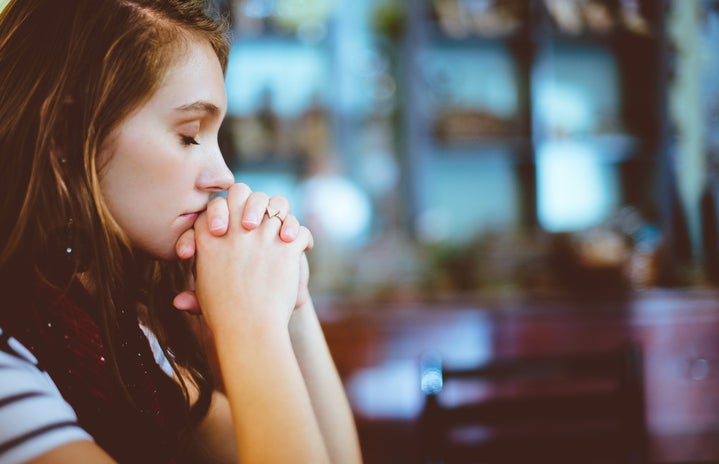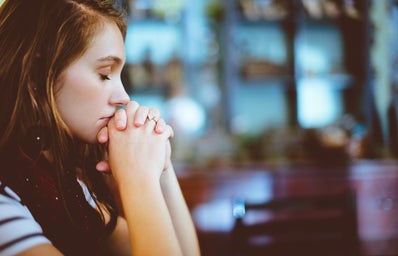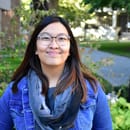Edited by Olivia Spahn-Vieira
How’ve you been lately? And by “lately”, I mean “since this pandemic started.” For a moment it seemed like the world was at a red light – we all thought we just needed to wait a short while for the light to turn green, so we could move on with our normal lives. The light hasn’t changed, so a traffic guard comes to the middle and gradually let’s the people pass, but only when it’s safe to do so. People may be living their lives now, but it’s not the same as it used to be. There’s more fear, anxiety, and uncertainty than before. Somehow we’re still going through the motions and trying to push through. How do we do it? How do you?
How is someone supposed to live life while there is a deadly, invisible virus spreading like wildfire? How do you cope with that reality? I’ve learned that some just have hope and that’s what’s getting them through. Some are just abiding by the rules placed for them. Others are actively helping in their communities and working on the frontlines to help make a difference for people struggling through these tough times. With some conversations, I’ve also learned that many are at peace, but how? How can anyone find peace when there are people dying, losing their jobs, and living in fear? Through their faith.

I asked four volunteers to share how they’ve been coping with the pandemic through their faith. With respect to their privacy I’ll be referring to them with an initial: M – a young Roman Catholic woman, Y – a young Muslim man, Z – a young woman who was raised to practice Islam but considers herself more spiritual than religious, therefore she doesn’t strictly participate in all practices of Islam, and F – a young Evangelical Christian woman. Despite being a small group, these four were sufficient in helping me understand how someone is capable of finding peace during a long, strenuous season such as this.
I asked each of my volunteers a series of general questions to get a better understanding of how their faith has and is helping them and I invite you to ask yourself these questions to practice self-reflection:
-
What faith/religion do you practice or believe in?
-
What has changed with your religious practices/rituals because of the pandemic?
-
What do you do through your faith that helps you cope with the stresses and uncertainty of the pandemic?
-
How has the pandemic affected any religious gatherings, events, or holidays?
-
How are you able to find peace in times like this, when there is chaos and negativity everywhere? What about your faith allows you to have any kind of peace?
-
Would you say your faith has gotten stronger because of the pandemic? Weaker?
-
How does your faith change or affect your view of the situation we’re all in?
Changes
For all of my volunteers, the main change that they had to adapt to was the way in which they practiced their faith. For example, for a long time, they could not enter their places of worship and had to settle for alternatives.
M can’t attend mass as often anymore because there is an occupancy limit for the chapel. She expressed that mass doesn’t feel the same as it used to when the church was full of people. The occupancy limit also keeps many from doing confessions at the church – the church’s alternative is to have drive-thru confessions and confessions done by appointment. She can’t even shake another parish member’s hand during the part of mass that requires her to wish “Peace be with you” to others. Praying privately and touching the holy water at the chapel is also out of the picture now to keep everyone safe.
Parish Member: a member of the local church
Confessions: the confessing of sins to a priest or authority in your church
Likewise, Y can’t always go to the mosque for Friday prayers anymore. He explained to me that in Islam, when they pray in groups, they stand shoulder to shoulder, toe to toe and that’s just not possible to do while abiding by the rules. Similar to M, individual prayers also can’t be done anymore because they have to vacate the mosque immediately before the next group arrives for prayer.
As for F, she’s been watching church livestreams and recorded church services on YouTube. Despite the church being open to a limited capacity of people (each person has to register and reserve a spot), she explained that her family is not willing to take that risk, especially when one of her family members is immunocompromised. However, she expressed her concerns about watching recordings rather than attending in person, “We used to wake up early to get ready for church on Sundays, but now that we know it’s recorded we always sleep in and end up leaving the service to whenever we find it convenient; sometimes we end up forgetting to watch because it was pushed under other priorities.”
Each of the volunteers had to celebrate holidays at home this year. M and F celebrated Easter, while Y and Z celebrated Ramadan. Both holidays often consist of family gatherings and visits to their places of worship, but obviously that could not be done and from what each volunteer told me, it was clear that holidays did not feel the same. Z expressed her thoughts on Ramadan this year since they could not gather: “… it made the whole holiday meaningless. It did not feel like it was Ramadan, and if it doesn’t feel like it… What’s the point?”
Easter: “Easter is when Christians remember the sacrifice Jesus made on the cross for the sins of every person on Earth, but also celebrate his resurrection three days later. We often have a big feast as a part of the celebration” – F
Ramadan: Ramadan is a time for people to be together. Aside from the seemingly religious aspects of the month, community is most important. Usually families would invite each other to break fast (at dusk). People would go to the mosque to pray during the day or to start their fast before dawn.” – Z
Prayer
Nonetheless, she and the rest of the group confirmed that although aspects of their life were changing, they could still find peace, even if it is just the slightest bit. Each of them stated that to help cope with all the uncertainty, they pray.
M prays every night before sleeping or in the middle of the day if she’s feeling extremely stressed about something. For her, it’s the reflecting portion about prayers that allows her to find peace in it – just the practice of reflecting on herself and her faith with God allows her to feel at peace. As for Z, she wants to make it clear that she rarely ever prays, but when she does it’s because she’s not in a good mind space or she just had a “good” cry. This is what she says prayer is like for her: “…my cousin told me that praying physically makes you and your soul feel better. So, when i need to feel better, I do it. I am going to be honest, I have no clue what she feels after she prays but I have not felt that. I guess I keep doing it in hopes that maybe one day, I will feel better. The thought of that alone comforts me.”
F also elaborated on her experience with praying during the pandemic: “I’ve been praying for the sick, families of those who’ve died, those who don’t believe it’s happening, the health and safety of all the frontline workers, and for my family. I’ve also been praying to be strengthened by all the bad things that are happening and thanking God for the blessings I have but often take for granted. Prayer is more than a ritual to me; it’s my only way of communicating with God. I can do it privately, with people, and anytime. Chaos is often loud and prayer eliminates it because it’s such an intimate and reflective act. It requires silence which leads to a moment of peace and stillness. And if you choose to close your eyes when praying, you choose to block out the rest of the world for a moment, so that you can speak to God.”
Scripture and Community
To cope, Y and F have also turned to scripture. F has been reading and studying the Bible more because she wants to fully understand God’s message for her and all God’s people. Along with prayer, Y plays recitations of the Quran. He found that a line specifically helped him cope with the pandemic:
إِنَّ مَعَ الْعُسْرِ يُسْرًا
“[It] roughly translates to ‘with hardship comes blessings.’ So whenever I feel stressed I’m always reminded that what I am going through right now can be overcome and there’s something waiting for me at the end.” – Y
You’ve probably heard at some point that “humans are social beings” or that “humans can’t survive without community,” M and F prove that to be true when they told me about their religious involvement at church and at school and how it’s been a factor in keeping them sane and at peace. M attends online faith study with other youth ministry leaders at her church and she holds online youth ministry activities. She said that discussing God’s love through faith studies with other Catholic individuals her age ensures that she’s not alone and has people to rely on in times of need. F proudly reps her faith group at UofT, Power to Change (P2C): “Despite my shyness I’ve tried really had to surround myself with people of Christ who are like me, and the people at P2C help me maintain my faith and I’m reminded at our now virtual weekly gatherings that I am not alone in this difficult time. It also gives me joy to know that there are always new people to meet and share my faith with.”
The Pandemic with Faith in Perspective
M – “My faith makes me feel as if this pandemic will pass eventually and that maybe it is part of god’s plan to make people become kinder towards others and a time to reflect on the sin we have committed throughout the past and make a change.”
Y – “My faith helps me stay optimistic and keeps my head up … it helps me remember that there’s better days to come”
Z – “The pandemic has made me more spiritual in the sense that I sometimes think ‘Hell, maybe there is a greater being that is controlling this and he just got so mad and f***ed us over.’ There is something comforting about ‘blaming’ someone else or even just convincing yourself that this is the way someone who has more power and control… wants it to be. It definitely takes some of the pressure off of yourself as an individual and lets you move forward.”
F – “I find peace in the fact that the world is temporary and that God is always in control. Despite how scary everything on earth is right now, it’ll end with me in heaven alongside God having a pretty good time. Knowing that God has a plan for all the bad things happening alleviates the anxiety and pressure off me. I may not always like how God’s plan is going, but who am I to question the one that created me and is infinitely wiser? Faith isn’t just believing that there is God; faith is a matter of trusting. In the same way I can have faith in a chair holding me up and keeping me from injuring your tailbone, I have faith in Jesus and his plan of goodness.”

Each of the volunteers said that as a result of the pandemic, their faith or spirituality has overall gotten stronger. There’s something about pain and suffering that really strengthens your character and almost every aspect of you, especially if it’s out of your hands. No one wished for this pandemic, but it’s here. All we can do is live life, follow the health and safety protocols, and try our best to find peace for as long as we can. Thank you for taking the time to read this article of mine. I really wanted to highlight the fact that it is possible to find peace during the pandemic. With these four students, it’s through faith and I hope that during this pandemic, you will also find peace.
If you’re considering looking to religion or faith as a way to cope with the pandemic and find some peace in your life, some of these students have some words for you:
“…I see the benefits of religion. I get it, the subsections of it are so satisfying. In terms of the current situation, I think letting go and just doing what you need to do to get past it is the best way to do that. Gaining a spiritual conscience is, in my opinion, the easiest way to do that because no one ever needs to fact-check a religion. It just exists. And if you take that and turn it into a coping mechanism, regardless of anything else, you have found peace and a way to cope during these sh***y times.”
“I would say using religion as a way to cope has been effective in terms of finding peace during this chaotic time in our lives.”
“If you are considering looking to faith to cope with the pandemic, I say ‘Go for it!’ I hope you find the peace and love that you’re looking for. My ultimate goal is to be able to say 2 Timothy 4:7 before my time is done here: ‘I have fought the good fight, I have finished the race, I have kept the faith.’ I share this, to tell you that for me, faith is what’s helping me survive and fight these tough times, as I’m reminded that as long as my faith is intact, I can reach the end of the finish line and the end the pain and suffering. My faith has gotten me through depression and anxiety; it’s gotten me through many horrid exams at the Exam Centre; it’s getting me through this pandemic, and I pray that faith – if that’s what you’re considering – can get you through whatever it is you’re struggling with right now.”


